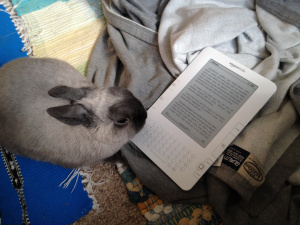The Best American Science and Nature Writing 2014

Guess what she prefers
The Best Science and Nature Writing books are generally correctly named, and the 2014 edition (edited by Deborah Blum) was no exception.
Basically someone with more time and …well, probably they are paid for it, but they locate and collect the Best articles on the topic of the year, from various magazine-like sources, and then combine them into one wonderful volume. Usually there’s one article that I’m not enamored of, but I think I read all of them this year, and generally with glee.
Except for the one called “Why the Brain Prefers Paper” by Ferris Jabr. That one annoyed me greatly. Not because it was bad, no no, I’m upset over the principle of the thing.
There’s a lot of …sentiment going around saying that reading ebooks is a horrible thing, that’s ruining our memory, our ability to read long-form, our talent for processing facts, and probably our critical thinking skills.
Now, I’m not saying ebooks are perfect, but I would argue that the science I’ve so far seen presented about how Evil they are is…unconvincing, and that for a number of reasons. First, a lot of these studies are small; 50-75 people, one study, results not replicated (yet?). Second, there are a lot of variables unaccounted for; are the ebook-people used to reading on screens? What sort did they read on? was it on a monitor or e-ink? Third, many of these articles conflate reading ebooks with reading “news” articles online; lots of ads distracting in the background, ect. Fourth, when the comparisons are done for children’s books, they are generally “old school” vs. interactive almost-game ebooks, which is nothing like a fair comparison (one seemed to be those battery-powered noise-making-button-pushing [in so many ways] books vs. “old school” paper ones, which is not even a little bit like an actual ebook). And last, they tend to neglect the roll adding features– like, say…a better progress bar– would play; like “People will NEVER be able to find a lost page in an ebook! Quel horror! End this travesty now!”
So you get results like people reading a .pdf on a computer (LCD? CRT?) screen have a harder time remembering the information gleaned as separate from the experience of reading it vs. from students who read the article on paper (which, okay, .pdfs are awful in almost every situation). Or fifty people read a book on either paper or ebook, and then the ebook people had a harder time remembering the order of events in the story they read (but was it a kindle fire? was it a webpage? was it an actual e-ink reader? Was this the first time they’d read an ebook?). Or people tend to get distracted by links and videos and ads when reading electric sources (…that’s not a fucking ebook, dumbass). And parents prefer to read a paper book with their child over one with distracting buttons (oh fuck yes, I don’t even let my students lift-the-flaps in books when I’m reading those …but I’ve read them ebooks on my tablet with no stress).
I want to see studies done where it’s e-ink with a progress bar vs. without. Where it’s a pop-up book vs. an interactive kids’ ebook, or a normal paper picture book vs. a simple ebook version of the same one. Where it’s reading an article from one of those horrible teen mags where you can’t tell what’s content and what’s article in the paper version vs. reading it online (with neither mistaken as an ebook). And I’d like to see all of this implemented as useful development tools for where to put ads when you want people to read your thing, or what to add to an ebook reader to make it more like a paper experience (and Amazon should know I have some suggestions…), or used to write a book about how to teach your child to focus.
Because so far, the take-away that I have from these articles is that we need a way to feel our “place” in a book that is more consistent, visible, and useful than a progress percentage you have to tap to find. And also that it is really fucking difficult to flip back (or forth) through an ebook, which, to be honest, I’m not sure that you can change easily. And otherwise we’re just a bunch of sticks-in-the-mud who don’t want to change or adapt, and feel that anything new must be despised.
I like to imagine that as writing (as opposed to oral story telling) came into vogue, there were lots of communal debates and lectures about how it was ruining memory, making stories inaccessible, causing readers to engage with the tales less, and so forth. Lectures that we probably don’t have any record of, because, well…for obvious reasons, they weren’t written down. And I think that in a few decades, our children will squint at these articles in confusion, and shake their heads at the foibles of the past.
It was also ironic that I read the article on e-ink. But it’s all okay, because having read it on a screen, I’ll probably forget the whole thing in a wee–oh, wait, no, I finished the whole book a week ago, and I’m still incensed by the whole thing. Huh. Fancy that.





